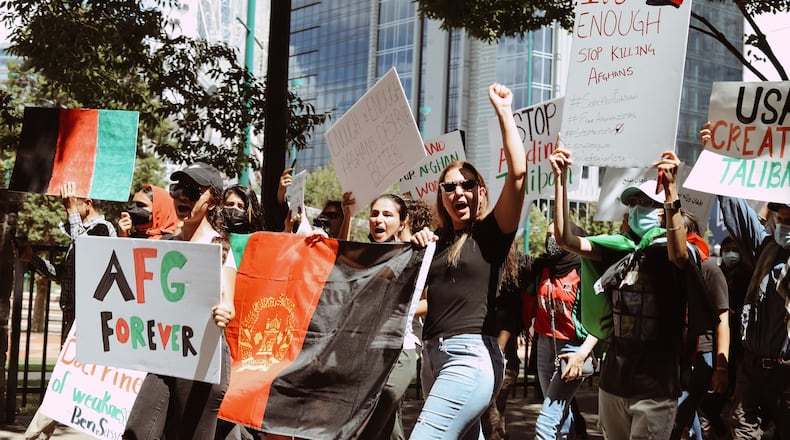The thought of sleeping just isn’t appealing to Hadia Husseini right now.
With her phone seemingly glued to her hand, the 24-year-old keeps refreshing her screen for updates from Afghanistan, a country she’s never set foot in. She doesn’t want to miss a moment of the changing situation overseas, and feels a deep need to help her fellow Afghans, even if it’s from thousands of miles away.
“We’re the ones who have to speak up,” Husseini said. “If they can’t make their voices heard, then at least we can for them here. I am going go out there and speak so that one day another woman doesn’t have to question where in history she lost her voice.”
Dozens of Atlanta residents, including Husseini, have already started to show their support for the Afghan people, by staging demonstrations near Centennial Olympic Park last weekend and organizing a demonstration on Aug. 28 as part of a global effort to bring attention to the situation in Afghanistan. Similar events are being planned that day in several cities around the world including Washington D.C., New York, Beirut and London.
Credit: Submitted By: Hadia Husseini
Credit: Submitted By: Hadia Husseini
“This is something we’re all pretty passionate about because this is something our parents went through in the ‘80s and we’re kind of dealing with it as well,” said Massod Jamshidi, 33, a demonstration organizer.
Jamshidi’s family immigrated to Pakistan in the 1980s, before coming to the United States. He sometimes thinks about how his life would have been different had his family never left.
“Would I even be in Afghanistan given everything going on?,” he said, adding that a desire to maintain Afghan culture and connection is what keeps the community in Atlanta tightknit. “Atlanta has, I think, a great community here and we’re hoping to kind of show that on the 28th.”
While demonstrations and aid efforts here are in full swing, some are focused on getting their families out of the country.
Umr, a former U.S. military interpreter, who asked that the AJC not use his last name due to safety concerns for his family in Afghanistan, said he wants nothing more than to reunite with his wife, Mahbooba, and their son, Armin, 2.
Umr’s family fled to Pakistan in the late 1990s when he was about 10 years old, and remained there until 2002 to escape the Taliban’s rule. He decided to help the American forces in 2010 after losing friends throughout the country at the hands of the Taliban. The military personnel he worked with were “very kind to me,” he said, and even supported him in his efforts to finish college.
His stint with the military came to an end in early 2013, and by the following year he came here thanks to the Special Immigrant Visa program, which authorizes Iraqi and Afghan translators and interpreters working for the U.S. military and who meet certain requirements to relocate to the United States. Umr returned to Afghanistan in 2018 where he got married and started his family.
He recently received an email from the U.S. embassy saying his wife’s documents are being processed and an interview needs to be scheduled in Kabul. That email was sent just days before the U.S. embassy was evacuated due to the Taliban’s takeover. Desperate to flee the country, Umr said his wife and son went to Kabul’s international airport hoping to catch a flight to the United States.
“She took this risk,” Umr said, explaining it was dangerous for his wife to be out without mahram, or a male escort that’s typically a brother, husband or father. “In the Taliban’s viewpoint if you are a lady and walking alone, then your life is more in danger.”
Umr has been in contact with Sen. Jon Ossoff’s Office for assistance and is waiting to hear about next steps.
“They need to do something, or someone needs to do something,” he said. “I’m looking for different opportunities to get them out of there. I don’t know what to do next.”
The United States has evacuated hundreds of civilians from Afghanistan over the past few days, and Gov. Brian Kemp suggested Tuesday that Georgia was open to taking in refugees. Flights out of Kabul’s international airport have resumed, but getting a ticket for a flight, or a seat on a evacuation flight, isn’t easy.
In a statement representatives from Ossoff’s office said they are working to “assist constituents with information and support regarding evacuation procedures and consular services for Americans who remain in Afghanistan and for SIV-eligible Afghan nationals who have worked for and with the U.S. government.”
Credit: Photo submitted by: Marjan Nadir
Credit: Photo submitted by: Marjan Nadir
As Husseini tries to process the reality in Afghanistan, she says she’s been experiencing survivor’s guilt for being safe in the U.S. This has manifested itself in the form of flashbacks of the “war on terror” and tragic events such as 9/11.
Nadine Kaslow, professor of psychiatry at Emory University School of Medicine said this type of response is “understandable,” and while everyone will process the stress in their own way, being with community, planning marches, and talking with people with similar life experiences can all be healing.
“For people with loved ones in Afghanistan, just like with people with loved ones in India during the pandemic, even though they weren’t there, it’s like their heart and soul are there,” said Kaslow, a former president of the American Psychological Association.
Husseini agrees and her emotions can be summed up with a phrase in Farsi which translates to: “Where the heart goes, the footsteps follow.”
“For us it’s like our hearts go there but our feet are kind of locked down and we can’t do anything,” she said.
Paradise Afshar is a Report for America corps member covering metro Atlanta’s immigrant communities.
If you go: “Stop Killing Afghans” protest will take place at 2 p.m. Aug. 28 at Woodruff Park, 91 Peachtree Street. For more information email khatuljamshidi2012@gmail.com or sikandar.husseini@gmail.com
Sen. Jon Ossoff’s office is encouraging Georgians who need Afghanistan evacuation assistance to e-mail afg-evac@ossoff.senate.gov or call 470-786-7800
About the Author
Keep Reading
The Latest
Featured






